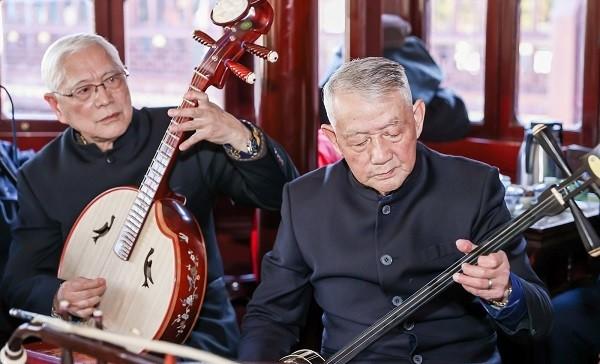
Pictured: A group of Jiangnan silk bamboo musicians returned to the century-old tea house, and the interviewee provided a picture (the same below)
Xinmin Evening News (reporter Yang Yuhong) Flute, erhu, Yangqin, pipa, sanxin, sheng, Ruan and other traditional ethnic instruments played a series of Jiangnan silk bamboo music, outlining the authentic Jiangnan charm. On December 27th, Huxinting Silk Bamboo Music Club was officially unveiled, and a group of white-haired bamboo lovers returned to the Centennial Huxin Pavilion Tea House.
Since the opening of Shanghai, Jiangnan silk bamboo has been popular in Shanghai for more than 300 years as a characteristic folk ensemble music in Shanghai, and was once a symbol representing the "rural sound" of Shanghai and Jiangnan region, and was included in the first batch of national intangible cultural heritage protection list in China in 2006. The traditional techniques of Jiangnan Silk Bamboo include you complex and simple, you high and low, adding flowers and variations, inlaying to give way, improvisation and other techniques, and gradually forming the style characteristics of "small, thin, light and elegant".
"Around 2000, I led most of the members of the Silk Bamboo Band out of Huxin Pavilion for more than twenty years. Today, we return to the century-old tea house and play the masterpiece repertoire with a lot of emotions. Lu Qinkang, a musician in his seventies, walked into the second floor of Huxin Pavilion with many old friends and played classic songs such as "Happy Song", "Six Plates of Flowers", and "Neon Song". He recalled that as early as the 1930s, a group of silk bamboo lovers and old folk artists made up their own minds and fixed themselves in the Tea Garden of the City God Temple, improvising while tasting tea and talking. After the founding of New China, this group of elderly people walked into the Huxin Pavilion Tea House, which attracted many young people to participate. In the 1980s, under the recommendation and proposal of many artists, he participated in the formation of the first silk bamboo band. They rehearse intensively every Sunday, and every Monday afternoon they meet at the Huxinting Tea House to play classical music, and the tea guests high-five each other and enjoy themselves.
Pictured: Yuyuan Cultural and Commercial Group and Changqiao Jiangnan Silk Bamboo Music Society jointly rebuilt the Huxin Pavilion Silk Bamboo Music Society
In 1986, Queen Elizabeth II visited Shanghai, and during a visit to Yu Garden, she walked up to the second floor of The Huxin Pavilion and sat down at a mahogany round table near the east window. She condescended, looked around, and was immediately attracted by the classical garden and temple market scenery, and said in a loud voice: "The scenery here is so beautiful!" It's beautiful! The waiter served her a pot of special Grade Lion Peak Longjing tea brewed with a purple sand tea set. Elizabeth II drank tea while admiring the elegant and pleasant Jiangnan silk bamboo.
At that time, Huxinting Tea House was not only the center of Shanghai Silk Bamboo Players' exchange activities, but also implied a special feeling and cultural identity, and once had the situation of "not being a master of the tea house". Lu Qinkang said that if a silk bamboo player can sit on the table of Huxin Pavilion and play a song, he will be famous in Shanghai. The calligrapher Ren Zheng specially inscribed the plaque of "The Land of Silk and Bamboo". As the Silk Bamboo Band left the Huxin Pavilion Tea House, the plaque mysteriously disappeared and is still missing.
On December 27th, the couplet plaque of "Jiangnan Yayun, Silk Bamboo Home" handwritten by folk music educator Wu Guodong was unveiled, opening the prelude to the reconstruction of the Jiangnan Silk Bamboo Society in Huxinting, which means that the inheritance of folk silk bamboo people will continue in this century-old tea house. After years of business adjustment and upgrading, Yuyuan Cultural and Commercial Group and Changqiao Jiangnan Silk Bamboo Music Club have jointly rebuilt the Huxin Pavilion Silk Bamboo Music Club, which will take the Changqiao Silk Bamboo Music Club as the team to attract more Jiangnan Silk Bamboo players to return to Huxin Pavilion and polish the cultural "business card" representing the unique humanistic feelings of Shanghai citizens.
Shanghai's newly announced 100 new performing arts spaces, the Huxinting Tea House, which has the reputation of "the first tea house on the sea", was successfully selected. "Holding a cup of fragrant tea, the window is the elegant landscape of the Jiuqu Bridge, the silk bamboo is pleasant to the ear, and the piano is harmonious." The relevant person in charge of Yuyuan Huxin Pavilion said that from January 1, 2022, Huxinting Tea House will inherit the tradition of weekly silk bamboo activities, and the Silk Bamboo Society will carry out Jiangnan Silk Bamboo Improvisation Activities every Monday afternoon, and invite Jiangsu and Zhejiang Shanghai Silk Bamboo Famous Troupes to come to exchange and perform every month. Lantern Festival, Dragon Boat Festival, Mid-Autumn Festival and other traditional festivals, Huxinting Silk Bamboo Music Club will also hold a special concert of Jiangnan Silk Bamboo to create an immersive cultural tourism leisure experience for citizens and tourists.